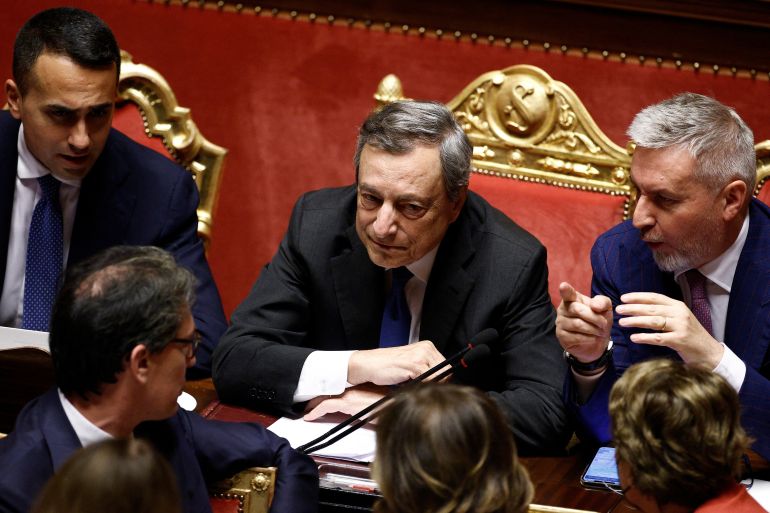What is next for Italy after Prime Minister Draghi’s resignation?
The collapse of Draghi’s government opens the way for early elections in autumn, with polls projecting a comfortable win by a right-wing alliance.

Italy has entered a new period of political uncertainty as Prime Minister Mario Draghi handed his resignation to President Sergio Mattarella.
The instability could add to the challenges already faced by the country, including soaring inflation and the economic fallout from Russia’s invasion of Ukraine.
Keep reading
list of 3 itemsItaly PM urges ‘pragmatic federalism’, eastward expansion for EU
Italy: Gov’t collapse averted as president refuses PM resignation
Draghi’s government will remain in office in a caretaker role until early elections in autumn, Mattarella said on Thursday, after formally accepting the decision.
Italy’s government crumbled on Wednesday when three of Draghi’s main coalition partners snubbed a confidence vote he had called to try to end divisions and renew their alliance.
The political crisis has upended months of stability in Italy, during which the former central banker had boosted the country’s standing in financial markets and helped shape Europe’s response to the war in Ukraine.
Why did Draghi hand in his resignation?
- Draghi had already tendered his resignation last week after one of his partners, the populist Five Star Movement, failed to back him in a confidence vote on measures tackling the high cost of living.
- Mattarella at the time rejected the resignation and told him to go before parliament to see if he could keep the broad coalition going until the planned end of the legislature in early 2023.
- Draghi won a confidence vote in the Senate on Wednesday and delivered a speech to the Senate in which he made a plea for unity.
- However, boycotts by three of his key coalition allies in the voting virtually doomed any prospects for the survival of a broad unity government.
- Five Star once again decided not to back him, saying he had not addressed their core concerns. The right-wing Forza Italia and League parties decided to shun the vote, saying they wanted a commitment that Draghi was willing to forge a new administration without Five Star and with new policy priorities.
What triggered the political crisis?
- The 74-year-old former European Central Bank (ECB) chief was parachuted into the prime minister’s seat in 2021 as Italy wrestled with the COVID-19 pandemic and an ailing economy.
- He formed a broad national coalition in February 2021 to tackle the coronavirus emergency and adopt scores of measures pledged to the European Commission, in return for the initial instalments of some 200 billion euros ($226bn) of European Union pandemic recovery funds.
- His government was marred by divisions that made the executive unable to make much progress in reforming an underperforming economy.
- Things turned sour earlier this year when Draghi missed out on the role of president in a vote of more than 1,000 parliamentarians and regional delegates.
- With a national election due in the first half of 2023, the parties in his coalition began squabbling with an eye to improving their poll standings.
What happens now?
- Draghi will lead a caretaker government, taking care of urgent matters until elections are held in September or October.
- The national vote is constitutionally mandated to be held within 70 days after the government is dissolved.
- Supporters of Draghi warned a government collapse could worsen social ills in a period of rampant inflation, as well as delay the budget, threaten EU post-pandemic recovery funds and send financial markets into a tailspin.
- Italian bonds and stocks sold off sharply on Thursday just as markets were bracing for the first interest rate hike from the ECB since 2011. The ECB was due on Thursday to unveil a tool to correct stress in bond markets for indebted eurozone members, such as Italy.
What has been the reaction?
- Based on current polls, a right-wing alliance led by Giorgia Meloni’s neo-fascist Brothers of Italy party and including Silvio Berlusconi’s Forza Italia and Matteo Salvini’s League would comfortably win a snap election, provided the three parties can form a coalition.
- Meloni, who has been calling for an early election since before the crisis erupted, was triumphant. “The will of the people is expressed in one way: by voting. Let’s give hope and strength back to Italy,” she said.
- Enrico Letta, head of the centre-left Democratic Party, which voted in support of the prime minister, said toppling the Draghi government meant “going against Italy and Italians’ interests”.
- France’s European Affairs minister Laurence Boone said ahead of Draghi’s expected resignation that the move would open a “period of uncertainty” and mark the loss of a “pillar of Europe”.